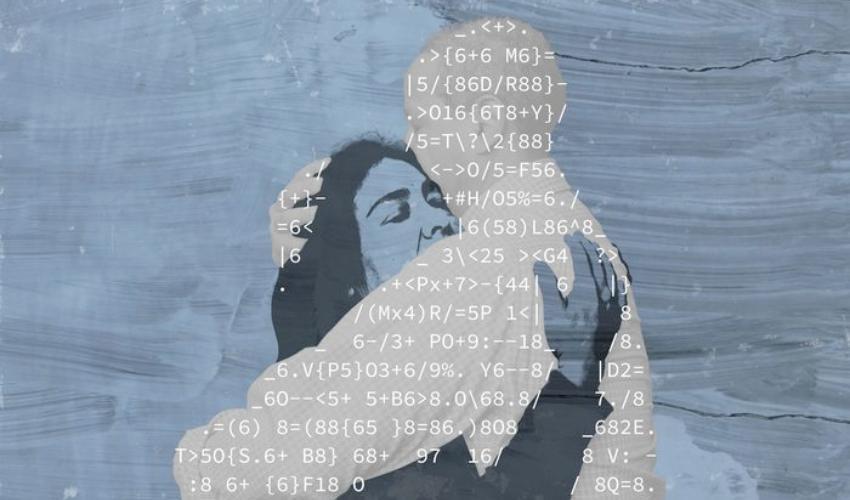From ‘Black Mirror’ to reality: AI technologies allow interactions with dead

When Michael Bommer found out he was terminally ill with colon cancer, he spent a lot of time with his wife Anett talking about what would happen after his death.
She told him she would miss being able to ask him questions whenever she wanted because he was so well-read and always shared his wisdom. This sparked an idea for Bommer: recreate his voice using artificial intelligence to survive him after he died.
Could artificial intelligence help with grief?

Bommer, a 61-year-old startup entrepreneur, teamed up with his friend Robert LoCascio, CEO of the AI-powered legacy platform Eternos. Within two months, they built a comprehensive, interactive AI version of Bommer – the company’s first client.
Eternos, which gets its name from the Italian and Latin word for “eternal,” says its technology will allow Bommer’s family to engage with his life experiences and insights. As the Associated Press reported, this development reflects a growing space for grief-related AI technology.
Black Mirror makes hauntingly accurate prediction

In the first episode of the second season of the series Black Mirror, titled “Be Right Back” (2013), a young woman named Martha loses her partner, Ash, in a car accident. Struggling to cope with her grief, Martha discovers a service that allows her to communicate with an AI version of Ash, created from his social media profiles and online communications.
As the story progresses, Martha takes increasingly drastic steps to bring this artificial version of Ash into her life, leading to complex emotional and ethical questions.
The parallels between “Be Right Back” and real life are striking. Both Bommer’s AI and the AI Ash in the episode offer comfort to the bereaved by allowing them to interact with a digital version of their loved ones.
However, these technologies raise significant ethical and emotional questions.
Katarzyna Nowaczyk-Basinska, a research fellow at the University of Cambridge’s Centre for the Future of Intelligence, notes that “very little is known about the potential short-term and long-term consequences of using digital simulations for the dead on a large scale.” She described it as “a vast techno-cultural experiment.”
Ethical concerns about communicating with AI version of the dead

Eternos is among several companies that have emerged to offer AI-based interactions with the deceased in recent years. StoryFile, based in California, allows people to interact with pre-recorded videos and uses algorithms to detect the most relevant answers to questions posed by users.
HereAfter AI offers similar interactions through a “Life Story Avatar” that users create by answering prompts or sharing their personal stories. Project December and Seance AI provide text-based conversations and voice recreations, respectively, with varying degrees of realism and emotional engagement.
While some embrace this technology as a way to cope with grief, others feel uneasy about companies using AI to maintain interactions with those who have passed away.
Tomasz Hollanek, who co-authored a study on “deadbeats” and “grief bots” at Cambridge, raises important questions about the rights, dignities, and consenting power of people who are no longer alive. He also points out ethical concerns about whether programs catering to the bereaved should advertise other products on their platforms.
Is Black Mirror turning into real life?

The Black Mirror episode ends with Martha storing the AI Ash in the attic, symbolizing her struggle with moving on. This mirrors real-life concerns about whether such technology might make the mourning process more difficult because there isn’t any closure.
Matthias Meitzler, a sociologist from Tuebingen University, explains that while some may find comfort in these technologies, others may perceive them as an eerie addition to traditional ways of remembering dead loved ones.
Ethical discussions about talking with deceased through AI

Robert Scott, who lives in Raleigh, North Carolina, uses AI companion apps Paradot and Chai AI to simulate conversations with characters he created to imitate his three daughters. Scott lost one daughter, his oldest, without sharing details, another through a miscarriage, and a third shortly after her birth.
He knows the characters he interacts with are not his daughters, but he says it helps with the grief to some degree. Scott logs into the apps three or four times a week, sometimes creating scenarios like prom night or asking the AI character questions like “How was school?”
“It definitely helps with the what-ifs,” he admitted.
According to Eternos CEO LoCascio, the legal rights for AI belong to the person on whom it was trained. It can be treated like an asset and passed down to other family members. He emphasized that tech companies “can’t get their hands on it.”
However, the commercialization of grief raises concerns.
Nowaczyk-Basinska stressed that, for the first time, processes of caring for the dead and immortalization practices are fully integrated into the capitalist market. This commercialization adds another layer of ethical complexity.

As technology advances, AI versions of deceased individuals will likely become more human-like. Bommer imagines that one day, his family members can meet him inside a virtual room. He is excited about his AI personality and believes it will only be a matter of time before the AI voice sounds more like himself.
Yet, his wife Anett remains hesitant about whether she’ll use the AI voicebox after his death. She imagines herself sitting on the couch with a glass of wine, cuddling one of her husband’s old sweaters instead of feeling the urge to talk to him via the AI.

The real-life emergence of AI technologies for grief and mourning, like those in Black Mirror, prompts important ethical, emotional, and societal questions. These technologies offer new ways to cope with loss but challenge the understanding of closure, consent, and the commercialization of grief.
As humans navigate these innovations, it is crucial to balance technological advancements with ethical responsibility, ensuring respect for the deceased’s memories and dignity while supporting the living’s emotional needs.



